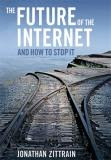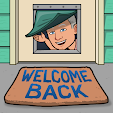 Jay made a post with an intriguing title: You are what you read. I agree completely. I have been reading more books over the past two years than in any other two year period in my life, maybe even when I was a student (I know, we're all still students). As other learning professionals talk about the books they are reading I find it too enticing not to get them and read them myself.
Jay made a post with an intriguing title: You are what you read. I agree completely. I have been reading more books over the past two years than in any other two year period in my life, maybe even when I was a student (I know, we're all still students). As other learning professionals talk about the books they are reading I find it too enticing not to get them and read them myself.
Jay mentions the Cluetrain Manifesto. I have referred to this book in many of my presentations because I still think that it should be required reading for anyone working in education. Even though it is now nine years old, the message still applies today as well as it did in 1999. Actually, it was probably a bit ahead of its time in '99, but definitely still very timely. I have re-read it twice in the past couple of years. Its a quick read and I'm trying to make their principles ingrained into my everyday thinking. In the true spirit of the net, you can read the entire book online for free. Still, they've sold millions of hard copies as well (there's a message there people!).
I just purchased three books. I have only read ten pages so far of Sir Ken Robinson's new book titled "Out of Our Minds, Learning to Be Creative." I have watched his fabulous Ted Talk about five times and find him to be very inspiring (in fact I'm listening to it right now as I write this). I've tried to encourage creativity in my elementary school technology club by having them make comic strips and music videos and design a new bedroom, etc., rather than learn how to keyboard better which is what they THOUGHT they wanted to do in the club.

The book-in-waiting (on deck) is Clay Shirky's "Here Comes Everybody, The Power of Organizing Without Organizations." Here's Will's review of it. He has also created a Here Comes Everybody blog, designed to both chronicle and extend the themes of the book.
In the hole (and when did that get changed from "in the hold?") is Jonathan Zittrain's new book, "The Future of the Internet, and how to stop it." Quoting from his website: "With the unwitting help of its users, the generative Internet is on a path to a lockdown, ending its cycle of innovation — and facilitating unsettling new kinds of control."
Two books that I've read most recently are 1) The Big Switch and 2) The Starfish and the Spider. Both of these books were recommended to me by Myk Garn. Good call Myk.
 "The Big Switch - The Wiring of the World from Edison to Google," by Nicholas Carr was a fascinating read. It is a pretty controversial book and you can find plenty of people who have reviewed the book that are taking shots at both the book contents as well as Carr himself. I really enjoyed the more historical part of the book dealing with Edison, Henry Burden, and Samuel Insull. The electrification of America is something that I really didn't know that much about. There's some good stories in there. I do buy into his basic premise about current day computing moving from locally installed software to software as a service/utility. In this interview, his first answer pretty much sums it up: Q) What is this big switch you see coming? A) "I think we’re at the early stages of a fundamental shift in the nature of computing, which is going from something that people and businesses had to supply locally, through their own machines and their own installed software, to much more of a utility model where a lot of the computer functions we depend on are supplied from big, central stations, big central utilities over the Internet."
"The Big Switch - The Wiring of the World from Edison to Google," by Nicholas Carr was a fascinating read. It is a pretty controversial book and you can find plenty of people who have reviewed the book that are taking shots at both the book contents as well as Carr himself. I really enjoyed the more historical part of the book dealing with Edison, Henry Burden, and Samuel Insull. The electrification of America is something that I really didn't know that much about. There's some good stories in there. I do buy into his basic premise about current day computing moving from locally installed software to software as a service/utility. In this interview, his first answer pretty much sums it up: Q) What is this big switch you see coming? A) "I think we’re at the early stages of a fundamental shift in the nature of computing, which is going from something that people and businesses had to supply locally, through their own machines and their own installed software, to much more of a utility model where a lot of the computer functions we depend on are supplied from big, central stations, big central utilities over the Internet."
"The Starfish and the Spider: The Unstoppable Power of Leaderless Organizations," by Ori Brafman and Rod A. Beckstrom. To give you the gist of their idea, I'll quote from their wiki: "How can Toyota leverage starfish principles to crush their spider-like rivals, GM and Ford? How did tiny Napster cripple the global music industry? Why is free, community based Wikipedia crushing Encyclopedia Britannica overnight? Why is tiny Craigslist crippling the global newspaper industry? Why is Al Quaeda flourishing and even growing stronger? In today's world to answer this it is essential to understand the potential strength of a starfish organization." I'm not quite sure how much of this applied to higher education where there will most likely always be leaders with concentrated powers within the organizations, but I find it interesting nonetheless.
The basic premise of Jay's statement that you are what you read (not sure if he coined the phrase or not, well, most probably not) is that our thinking is heavily influenced by what we read. I buy that, and besides the books listed above, these are the other books that have had the most impact on my thinking over the past couple of years:
Free Culture, by Lawrence Lessig
Wikinomics, by Don Tapscott and Anthony Williams
A Whole New Mind, by Daniel Pink
The Long Tail, by Chris Anderson
The Future of Ideas, by Lawrence Lessig
The Rise of the Creative Class, by Richard Florida
Getting Things Done, by David Allen
There are several other books that I'm not going to list because they didn't have as much of an effect on my thinking as those above. However, there's not one of the books that I've read in the past couple of years that felt like a complete waste of time. That's the advantage of getting your book recommendations from your network comprised of the people that you know are doing great things. In closing, I've probably also learned as much from the blogs that I read regularly as I have from all of these great books.
 How many social networks is too many? I'm pretty sure that I'm on my way to finding out the answer to this question. My first exposure to Ning.com was over a year ago when I signed up for the EdubloggerWorld network and shortly after that I signed up for the Stop Cyberbullying network. I'm not very active in either one of those networks, and until recently I really didn't pay that much attention to the Ning platform that was driving either of those networks.
How many social networks is too many? I'm pretty sure that I'm on my way to finding out the answer to this question. My first exposure to Ning.com was over a year ago when I signed up for the EdubloggerWorld network and shortly after that I signed up for the Stop Cyberbullying network. I'm not very active in either one of those networks, and until recently I really didn't pay that much attention to the Ning platform that was driving either of those networks.




